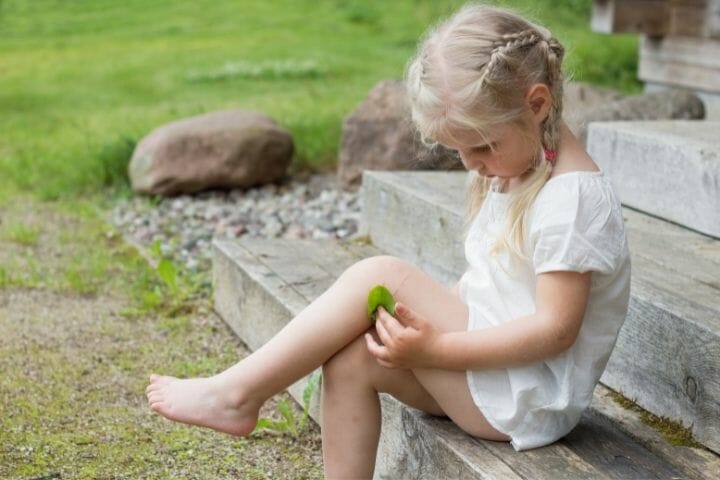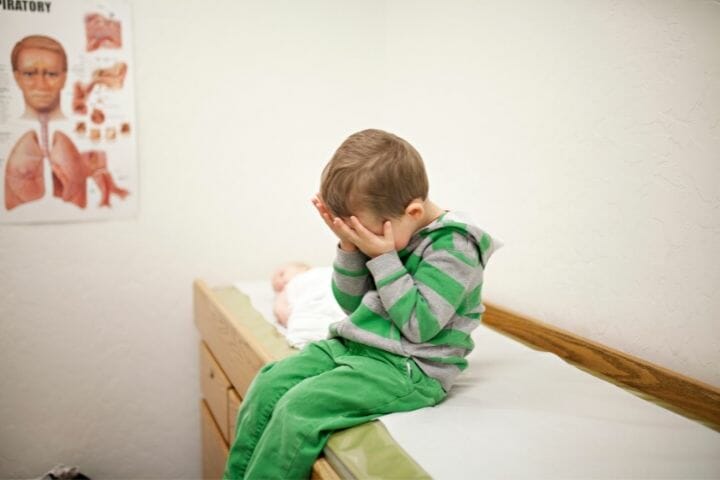Helping children cope with trauma is every parent’s responsibility, and this little guide might help.
Contents
Children are more vulnerable to accidents, abuse, violence, crimes, natural disasters – events that can be traumatizing even for adults. Thus, the parents or parental figures must take care of mental and emotional health as much as their physical health.
Neary 35mn children in America have gone through some sort of traumatic experience. The best way to take care of a child or young adult after suffering from a traumatic incident is via communication and a lot of it.

Amid the current pandemic, it has become more urgent than ever to be considerate and aware of our child’s thoughts, feelings, and emotions. So, parents and caregivers, buckle up and read this guide to help your slight one rise above trauma and live a healthy and happy life.
What Is Trauma?
To put it simply, trauma is an emotional response to an event that left an intense impact on one’s brain or body. The trauma can be physical or mental or can be natural or perceived. In the case of a child, it can seem more threatening to them than to an adult.
An event can be traumatic for one child and normal for another, depending on their nervous system. Thus, it is unrelated to compare an event as traumatic for everyone.
Some of the events that can be referred to as traumatic for a child are –
- Bullying
- Abuse of any kind (physical, emotional, mental, or sexual)
- Separation from a loved one
- Natural disasters
- Accidents
- Pandemic
- Neglect
- Ignorance
- Unexpected (negative) parental behavior or attitude
- Not having essential living means
You might like to read: How to Become a Caregiver
How Does Untreated Trauma Affect a Child?
Trauma happens when the brain responds emotionally towards an intense event, which often sets the child in a fight or flight response. The saddest part is that this can continue to adulthood and, if not treated, for a lifetime.
The good thing is that since a child’s body is young and the brain is flexible, the traumatic event or response can be reversed. Thus, they need to be treated and healed to avoid long-term harm to their brains.
Sadly, many children get deeply affected by their trauma, which interferes with their normal development – this affects them physically, mentally, and emotionally.
However, the impact of a traumatic event is also decided by the age, coping skills, attitude, and frequency of every child. For instance, if the child in question has a positive attitude, then chances are that they will be able to get past it and develop a healthy relationship with their body and, thus, with other people.
Many children are more sensitive than others as well and thus, feel everything at a deeper level. It can be challenging for them to cope with the trauma and, therefore, might need help with more parental love and guidance to come out of the situation.
The key is to be understanding, compassionate, and talk to your child with an open heart. Listen to what they have to say and ask questions until there is no emotional charge left in their brain about the situation.

Signs of Trauma in a Child
There are specific effects of a traumatic experience that can be seen in a child’s body language and behavior. The results can be physical, mental, emotional, or more. Some of the most prominent ones have been mentioned below to notice as a parent before you decide to communicate the same to your child.
Physical signs
Chronic illnesses such as heart problems, blood pressure, obesity, shortness of breath, which continue to adulthood, the inability of the body to control pressure and trigger fight or flight response, unexplainable sadness, extreme laziness without any sign of bad physical health, etc.
Mental signs
Difficulty concentrating and thinking, inability to switch from one thought to another, problem in retaining memory or remembering a scenario, prolonged sadness, anxiety, depression, and misaligned thoughts and actions.
Emotional signs
Low self-esteem and confidence, trust issues, difficulty forming relationships, trouble keeping friendships, feeling unsafe in one’s own body and, thus, being around others, inability to regulate emotions, etc.
Behavioral signs
Aggression, anger, inability to control body impulses, substance abuse, suicidal tendency, etc. Please note that behavioral signs in children can’t be observed that easily. However, these signs do start to show up during their teen years and, if they remain untreated/unnoticed, continue further to adulthood.
Understanding Adverse Childhood Experiences (ACEs)
Adverse childhood experiences often referred to as ACEs, are childhood traumas that are so intense and significant that they bring changes in brain development. These changes are usually not good news and negatively affect a child’s ability to perceive things, retain memory, social skills, learning ability, etc.
If the trauma generated due to a particular event remains unnoticed for a long time, it results in long-term health problems. Some adverse childhood experiences include emotional abuse, physical abuse, sexual abuse, emotional and physical neglect, a parent being treated violently, parental separation, household abuse, mental illness, etc.

What are the harmful effects of ACEs on health?
Frequent and long-time exposure to ACEs can severely affect a child’s body and mind. As mentioned already, these experiences create a negative charge in the body, which results in short and long-term health troubles, out of which, below are the most common ones-
- Depression
- Anxiety
- Adolescent pregnancy
- Inability to retain thoughts for a long time
- Reduced ability to respond
- Problems with learning and remembering
- Impaired memory
- Negative thought pattern
- Increased cortisol levels
- Difficulty in making friends and continuing relationships
- Survival mode instead of living in abundance
These problems, if continued to adulthood, can lead to severe conditions and habits including alcoholism, multiple sex partners, smoking, unintended pregnancies, aggression, fighting, suicide attempts, risk of violence towards spouse or partner, depression, over or underactive sexual life, life-threatening actions, chronic illnesses, etc.
How to deal with ACEs
The first step towards relieving your child from the pain of the trauma is to learn to communicate well with them. While there is no magical way to look inside their hearts, you need to help them return to their bodies and open themselves to you.
This can happen with much love and compassion towards your little one. Understand that they are more vulnerable than an adult towards these negative experiences and thus, need time to process it all and open their heart.
Once you get them to talk, be very patient with them as they open up. Ask questions, let them cry, and allow them to hug you, sit on your lap or have any other sort of physical touch to feel safe.
After passing the talking stage, make sure if they are okay or need professional help. If you feel that they are still not themselves, then see a child therapist. There is nothing wrong with seeing a professional as long as it is helping your child.
Your job as a caregiver, however, doesn’t end here. There is a concept known as resilience, and we shall discuss the same in the next section to make your child mentally and emotionally intense.

Resilience – The Solution to ACEs
If you have learned about ACEs, you may also have an idea about the concept of resilience. For those who do not know, it is more than an English word to begin with. It is, however, quite similar when looking at a solution for ACEs.
Resilience is an ability or a way to adjust one’s mind after a traumatic or bad experience happens. In the case of a child, parents or caregivers can create and maintain a safe and peaceful environment for their little ones to help them open up, communicate their experience to them, and teach them how to be resilient to reduce the after-effects of trauma.
To apply the concept of resilience to their kids, parents should –
- Learn about ACEs and their effects
- Teach their children about using emotions and feelings for their benefit and health, not otherwise around
- Create and choose to stay in a peaceful and safe environment for their children to cope with the traumatic experience
- Make sure that it’s not just the home environment but school and other places (where your child visits) that are also calm and safe
To teach the practice of resilience –
- One should have parents who understand and apply resilience.
- One should have a healthy relationship with their parents.
- One should have their basic needs, like food, house, bathing, personal hygiene, etc., met.
- One should have social connections who are supportive and know how to make the child feel safe around them.
- One should not shy away from building social and emotional skills. Parents can perform their job here and teach them how to manage their emotions and communicate what they feel, even if it makes them and the other person uncomfortable.
It is essential on the part of a caregiver or parents to educate themselves on ACEs and resilience to help their child better and make them strong enough to maintain a positive attitude in the face of any other traumatic experience.
Why Is Resilience Important?
If you understand trauma, especially in children, you wouldn’t question the importance of resilience. It is simply an ability to become stronger and healthy after something wrong or traumatic happens to a person, in this case, a child.
It is essential because every parent would love to see their child reach their highest potential and live a successful and healthy life. It might also be another term for ‘bouncing back’ referred to by Jody McVittie, co-founder of Sound Discipline.
Unfortunately, not many children are taught the art and importance of resilience or bouncing back. Thus, many children grow up as broken adults – this means that they do not receive guidance from their caregiver at the right time, nor did they get a safe environment to experience their needs and problems.
There can be many reasons for the inability of parents or caregivers to educate their children with the concept of resilience; it is mainly because the parents themselves are not aware of it. So, if you are a parent and reading this, start your education regarding the importance of resilience and bouncing back today!

Relationships Are Essential to Building Resilience in a Child
Whether a toddler or a kid, they will rely on you if you make them feel safe around you. So, the first and perhaps, the only significant step towards introducing resilience to your child is to build a loving and trusting relationship with them.
Here’s how it can be done –
Connect with them every day
You must seek opportunities to connect with your little one every day for at least an hour. Ask them about their day and all they did, whom they met, what happened at school, homework, interests, etc., everything that comes to your mind. Go for a walk in nature, have food together, read them a bedtime story, and do more exciting and creative activities that indulge them in creating a positive and safe relationship with you.
Make a point to encourage them regularly
Always remind yourself that encouragement doesn’t mean praising your child. The two are entirely different in meaning. Praise is shown when a child achieves something, whereas incentive drives the child to be their best self in who they believe they are.
For example, “I am so proud of you” is praise, but “You figured it out all by yourself” is encouragement. Similarly, “You are so intelligent” praises your child, but “Look, you made it and how far you have come” is encouragement.
Make them feel important and wanted
The best way to continue making them feel important is via giving them meaningful tasks to perform regularly. Take into account your child’s age and do not give them complicated tasks that they might have difficulty completing. Once they finish the job, applaud them, making them feel important and connect with you more and deeply.
Teach, not punish them for making mistakes
One culture that needs to be stopped is punishing children for their mistakes. This will only make them fear making a mistake and shut down instead of finding a solution to the problem they are facing.
If you punish them instead of helping them reach a solution, there is no point in calling it teaching. You must be there to help them understand the concept of each and everything if they make a mistake. Let’s all just learn to stop taking our frustrations out on our students and children and strive to become better elders to them.
Respect them like you would respect an adult
Children are at a growing age, but that doesn’t mean that they deserve to be treated any way adults want. It is even more important to educate them on how to be treated. Don’t hit them for no reason, apologize when you make a mistake, and always talk to them with respect, like you would do with an adult. This builds strong self-esteem and a sense of individuality in children, strengthening their mental ability and giving rise to a resilient nature.
How To Help Children of Different Age Groups Cope With Trauma
You are the first teacher of your child. Thus, it is essential to know what to say to them to make them feel at ease. In this section, we will divide children into different age groups and educate ourselves individually on how to help them get over their traumatic experiences.
How To Help Children From 0 to 2 Years of Age
While there are fewer chances of a newborn to experience any sort of trauma, a baby older than a year old can share one. Thus, you should know exactly what to say to them to better cope with the situation.
Common signs of trauma in this age group
Some of the typical trauma signs to look for in infants and two years old children are as follows
- Fussiness can also give an impression of irritability
- Difficult to feel calm
- Clinginess to parents
- Reluctance to learn new things and explore new hobbies
- Crying and fearfulness
Ways To Support Them
- Try your best to stay and feel calm around them. Babies can sense the energy around them because they are so sensitive. If you are overwhelmed or anxious, you might scare them or make them.
- Always use a soothing voice with children that young. This helps them relax and understand that they are loved and respected. Infants can feel the love in the voice and respond the same way.
- Simply touching, talking, and maintaining eye contact with a baby or a year old kid makes them feel safe on an emotional level. As a parent, you must give them human touch to make them feel better.
- Talk to them while you are doing their tasks. For example, “I am going to change your diaper,” “Are you ready for the bath because I have made it ready for you,” and “I will cook your favorite dish for you, so wash your hands and set the table.”
- Take regular breaks to recharge your mind and body as well. It is as important as taking care of your child’s emotional health.

How To Help Children From 2 to 5 Years of Age
Children advance physically, emotionally, and mentally during these ages, and thus, it gets even more critical to check on signs of any trauma. Children react or respond to a situation exactly like their parents during this age. If you are calm, your child will remain steady. However, if you are angry, your child will feel your emotions and feel scared or mad at someone else.
Common signs of trauma in this age group
- Irritability or fussiness
- Frequent tantrums to get things done their way
- Clinginess to one or both parents
- Activities levels unusually higher or lower than their peers
- Repetition of the traumatic event over and over in conversation
- Difficulty in calming down
- Crying and fearfulness
Ways To Support Them
Let’s see some of the ways to help the children of this age group feel supported emotionally and cope better with trauma.
Create a routine for them
Try to keep up with them as much as you can. In this way, they become familiar with an environment that’s safe for them. However, bringing creative measures to fill their excitement is a great way to build confidence and experiment with things.
Make your child feel safe by hugging them, kissing them, staying around more than usual, etc. Use simple phrases like, “Don’t worry, mommy’s here.” This will mean the world to their fearful state of mind.
Be careful of what you say to your child.
They are extra sensitive when dealing with traumatic experiences and can pick up your anxiety, anger and other negative emotions. Thus, it is better to soak positive emotions, such as love, compassion, and empathy.
Encourage them to share their feelings, thoughts, and emotions with you.
Teach them that it is okay to share their feelings with their parents. It is essential to communicate what they feel with people close to them. You can simply ask them about their day or how they are feeling to get a reply.
Show extra support during this time.
Children who go through trauma at such an early age get anxious quickly. Thus, they need their parents’ help more than usual. Make them sleep with you for a few days, tell them bedtime stories, let the light remain on through the night for them to feel safe, etc. This also helps them cope well with the trauma.
Continue and maintain the routine no matter what.
It is more important than ever to continue your child’s activities as much as possible. Have regular meals simultaneously, go to bed at the same time, say prayers before meals and sleep, sing songs together, etc., as you did before the bad event happened. If you have relocated to a new place, it is essential to create a new routine for your child and stick to it.
Distract them with new activities.
Introduce a new hobby or activity and add the same to your child’s routine to help them move on from the trauma that they or all of you have faced together. Arrange for playdates, do karaoke nights, go for a road trip, etc., to distract them from what has already happened. Use good energy to fill them up once in a while.
Encourage them to tell their story.
It is so essential for your child to be able to tell their story to you and to anyone who asks. However, it will never be easy for them to express their emotions, mainly first. That is why you need to encourage them to speak up and allow it to flow through them. They can also express their feelings through different portals like art, drawing, painting, and writing. You might have to see what medium works the best for them.

How To Help Children From 6 to 11 Years of Age
When scary things happen to a child, their parents are the first humans they run to because of the sense of comfort and security they provide. Even though children who belong to age group 6 -11 years can tell how they feel and have more developed brains, they still need to be taken care of well and soundly after a traumatic event takes place.
Common signs of trauma in this age group
Some of the common signs related to trauma in this age group are listed below –
- Anxiety
- Fear of going to school or stepping outside the house
- Sleep disturbance
- Low or unusually high appetite
- Fear of losing a loved one in future
- Withdrawal from social events
- The trouble with memory and remembering things
- Academic concerns like significantly drop in grades
- Absolute refusal to discuss the event that caused them trauma
- Physical discomforts, such as bad digestion, headache, dizziness, lethargy, etc
- Denial of the traumatic event to have occurred
- Denial of future events that can hurt them
- Repeatedly asking the same questions
- Not present in the current moment
- Inability to connect with people around them
- Irrational fears, crying and mood swings
Ways To Help Them
While it can be a bit challenging to convince the children of this age to follow certain habits and routines to feel better, it is not entirely impossible, especially if you inculcate the habit of discipline in their minds. Check out the below pointers to learn how to help them deal with their traumas.
Assure and reassure
Many times; your child will be worried about the traumatic event that happened and that it can happen again.
It is okay to tell them that earthquakes, tsunamis, and other natural events or personal loss is a part of life and one needs to embrace the present rather than run away from it.
Do whatever is in our control and let the rest go because a higher power always comes to the rescue. This also builds faith in them and gives them the strength to get back on track.
Make them feel safe
We believe that after so many repetitions, it must have become quite clear that making your child feel safe is the most important thing ever! Whether it is school or home, they must always feel safe, and in case they do not, they must convey the same without the fear of not being heard.
Keep them busy with activities
You can help them figure out a new hobby, join a new sport, go to playgroups with their friends, etc. This will help them distract themselves from the traumatic event that happened.
Get them to talk
They need to talk about their feelings and emotions related to the incident that left them traumatized. Start with, “How are you feeling?” and then continue the conversation.
Find children who have recovered and listen to their stories
To bring your child out of their trauma is first to make yourself believe that they absolutely can. For encouragement, we would suggest you talk to a professional and get in touch with children who have done it and now live an everyday and happy life.
Limit electronic/media exposure for a while
From TV to newspapers and smartphones, limit the use of all these devices for the time being since it leads to sensory overload and can magnify the trauma and discomfort surrounding the same. Avoid the graphic images of the event that left them traumatized as well. You will be thankful in future that they came out of the trauma because of your tough decision.

How To Help Children From 12 to 18 Years of Age
Adolescence is the time of one’s life where significant physical, social, and emotional changes occur. Since it is already a challenging life for young people, a traumatic event can double their trouble. This is also when the rebel teenager is about to blast out, and everything that parents tell them to somehow seems like a way to control their life. Thus, you have to choose your words and actions carefully while working through a traumatic event with them.
Common signs of trauma in this age group
Even though children at these ages are competent to channel their emotions and find ways to heal their trauma, feeling safe to talk in the presence of their parents can help them heal better. Some common and most noticeable signs of trauma in teenagers have been listed below –
- Avoidance of feeling the traumatic event
- Mood swings and unexplainable anger
- Irritability
- Resentment
- Change in appetite (either too high or too low)
- Sleep disturbances (possible nightmares)
- Panic attacks and anxiety about the future
- Fear of moving forward; feeling stuck
- Considerable downfall in grades
- Problem remembering things; impaired memory
- Suicidal thoughts
- Depression
- Problem in concentrating
- Negative thought pattern
- Doing hazardous things like indulging in fights or drinking alcohol
- Detachment from others
- Functional impairment – inability to function daily tasks like going to school, playing, meeting people, etc.
- Constant repetitions of the traumatic event in mind
- Behavior problems
Ways To Help Them
At this point, it becomes essential to seek help for your teenage child in case you see more than 5-6 signs of trauma in them. They are at a growing age where focusing their energy and time on building a life is essential, so, by all means, go ahead and help your child in the following ways.
Make them feel safe around you always
At this point in their life, they have no idea what they have been thrown into. From feeling unexplainable emotions to witnessing new emotions, a teenager goes through a lot, let alone the pressure of finding a career and excelling well at school.
Thus, you need to understand that your child feels safe with you, in their room, in your house, in the school, and only then will they be able to feel safe in their own body.
Give them small responsibilities
Before discussing this further, we would like to clarify that you shouldn’t burden them with heavy responsibilities – we mean small responsibilities, like washing the car, cooking the meal at one time, cleaning the room, or clearing the room garden, etc.
This will inculcate a sense of adulthood in them, and they will feel worthy of living a happy and successful life.

Be open, flexible, and understanding
At this age, children want their caregivers to be understanding of their needs and priorities. Even though it could be a significant change for you, keep your mind open and heart calm to be the best parents that you can be to them.
For example, you can understand the change in their behavior when they no longer share their emotions. You can ask them about the death of someone in your house because, in all urgency, they will not be able to talk about it. In the same way, you can be a bit flexible about the rules related to academics for a while.
Don’t throw hands if they score low in a subject, considering they are going through so much already.
Consider professional help
Teenagers avoid sharing the details of their thoughts with their parents or caregivers. Thus, it is essential to take them to a good therapist, who would know exactly what questions to put forward.
As scary as it sounds, you have to let go of control at one point in life and do what’s best for your child. It would be better if you encourage your teen to take action and get professional help to find themselves again and become a better and happier version of themselves.
If not a therapist, then go for peer groups
If your teen is uncomfortable with opening up to a stranger, who, by the way, is also a professional, well, then you can consider peer groups for their healing. Some children are comfortable talking to people of their age or those who are going/have gone through similar experiences in life. If you cannot join, perhaps you can organize one and invite people in.
You might like to read: Sandwich Generation-Caring For Young Children And Elderly Parents At The Same Time
Trauma and Mental Health
Trauma can be disruptive if not treated or checked early. Even after being treated soon, people show several signs that their mental health is deeply affected. Trauma experienced before can severely affect a child’s ability to function. This continues to adulthood until the person him or herself understands that there might be a problem with them.
More than 80 percent of children in foster care get diagnosed with mental health issues, including ADHD (Attention Deficit Hyperactivity Disorder), ODD (Oppositional Defiant Disorder), anxiety, depression, and more.
Consider the following tips as well
Identifying the triggers to reaching the root cause of the problem is the most viable way to keep your mind healthy and functioning well. Thus, these tips might help you and your child to live a better life.
- Identifying the triggers, even if it seems something normal to you but agitates your child. Be aware of the patterns.
- They are listening to their problems and discomforts with utmost love and patience.
- Communicating what you think will help them take them to a professional to talk their problems out. Many children remain misinformed about the event and thus, fail to accept what’s the reality of it all. Communication helps this way.
- Be available for them on both emotional and physical levels.
- Always make them feel safe as they share their trauma-related problems with you. Do not react; respond. If you respond to their thoughts and feelings, they might retreat to their cocoon and avoid sharing anything with you again. Thus, it is essential to be patient and listen to their thoughts, even if they do not make sense to you.
- Encourage them to go out and try new things but do not force it because there are chances that they will flip out and completely give up on trying. We shouldn’t want that during the time of their processing trauma.
- Find ways to relax them like listening to songs, reading healing books, deep breathing exercises, writing affirmations, sending positive thoughts to their inner self, etc.
- Keep them moving via exercise, dancing, yoga, or any other sort of workout. When they sweat, the toxins come out as well. The cortisol levels go down as the endorphins increase and thus, makes it better for the positive emotion to come in.

Wrapping Up
The Center for Disease Control and Prevention (CDC) has claimed that ACEs are one of the significant health issues in the 21st century. We believe that the lack of awareness and knowledge regarding the topic is one of the main reasons.
Thus, with intentional living backed by the love and support of caregivers and loved ones, a child can get past the traumas of their lives and accept life as truly a beautiful experience.
So, go ahead and help your child process all kinds of emotions and understand the power of positive emotions and resilience so that nothing can slow them down again, yes.
We hope some of this information has been useful in dealing with a child in your care who has gone through a traumatic experience. If you have comments upon what we have written, or just want to share your experience, please do write to us in the comments section and we will respond back to you.
If you liked the content, do please share it with others who are in need of similar guidance.
